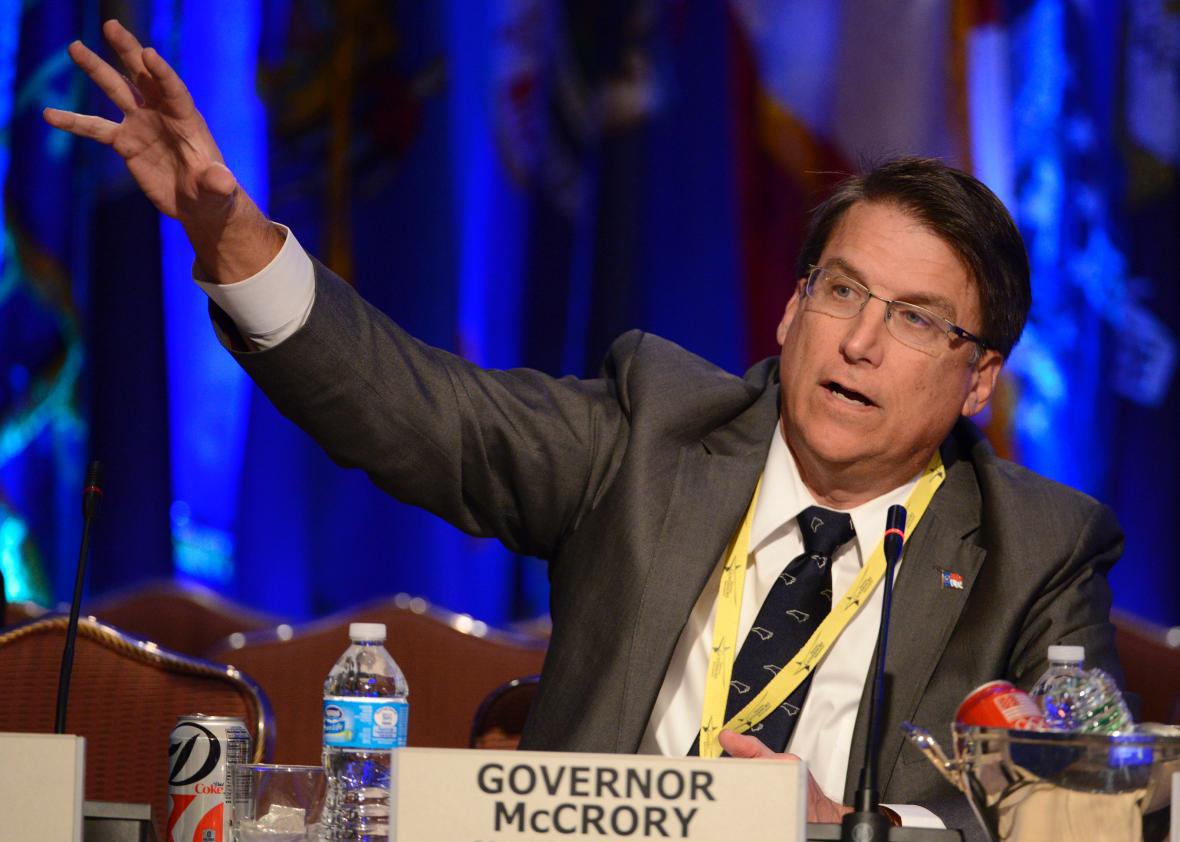HB2, North Carolina’s law forbidding transgender people from using public restrooms that comport with their gender identity, puts trans people in an impossible double bind and infringes on their autonomous decisions over medical treatment. Although Gov. Pat McCrory claims that trans people who have “undergone a sex change” (his term) will be able to change their birth certificate and therefore use the public bathroom corresponding with their gender identity, transgender people will in fact be impeded from having surgery and will therefore be barred from accessing bathrooms consistent with their gender identity.
How so? HB2 conditions entrance to a multi-occupancy single-sex public restroom on sex as “stated on a person’s birth certificate.” A separate North Carolina law provides that the gender marker on a birth certificate can only be modified if an individual has undergone what North Carolina labels “sex reassignment surgery.” (The increasingly preferred term is gender confirmation surgery.) But under the prevailing medical recommendations, a person only qualifies for certain surgeries if they have lived consistently for 12 months in the gender role that conforms with their gender identity. That often includes using the restroom corresponding with one’s gender identity. Therefore, HB2 interferes with the medical requirements for obtaining surgery in the first instance.
Let me spell that out in more detail. According to the standards of care developed by the World Professional Association for Transgender Health, it is recommended that adult individuals needing metoidioplasty or phalloplasty (procedures to create a penis) or a vaginoplasty (a procedure to create a vagina) live for 12 continuous months “in a gender role that is congruent with their gender identity” before obtaining those surgeries.
Pursuant to the standards of care, “[d]uring this time, patients should present consistently, on a day-to-day basis and across all settings of life, in their desired gender role. This includes coming out to partners, family, friends, and community members (e.g., at school, work, other settings).” Presenting consistently on a day-to-day basis can include using the restroom that corresponds with one’s gender identity.
But, as discussed, in North Carolina, one cannot use a single-sex public restroom until after having surgery. Using a single-sex public restroom is probably one of the few activities in many people’s daily lives that is, in fact, segregated by sex. How, then, is a person supposed to live consistently for a year in their true gender role if they are forbidden from doing one of the principal social activities that is sex-segregated?
In other words, HB2 creates a catch-22 even for those transgender individuals for whom certain surgeries are personally and medically needed in order to transition. HB2 requires surgery before using a single-sex bathroom but erects significant barriers to compliance with the recommended medical prerequisites for having particular surgeries. This dispels the myth proffered by McCrory that HB2 leaves meaningful room for transgender people to use bathrooms that align with their gender so long as they have had the legally mandated surgery.
The double bind for transgender people who do not need particular gender confirmation surgeries to live comfortably and consistently with their gender identity is even more apparent. Because such people are forbidden from using the public restrooms that correspond to their gender identity because they have not had the required surgery, every time they use a single-sex bathroom that does not match their gender expression, sensitive, intimate information about their identities and their bodies will be publicly disclosed. If they want to avoid such outing, they will be forced to undergo some sort of surgical intervention—surgery they may not need to live comfortably with their gender identity or that may be medically inadvisable or prohibitively expensive for a particular individual.
In addition to their social and human costs, these catch-22’s have legal implications. In particular, they amplify the claim asserted in the lawsuit challenging HB2 that the law interferes with an individual’s ability to refuse unwanted medical treatment and expands it by highlighting how HB2 also impedes the ability to pursue surgery for those transgender individuals who need it.
Several Supreme Court cases have suggested that the Constitution contains limits on the state’s ability to interfere with individual autonomy over medical treatment. For example, in Griswold v. Connecticut, the Supreme Court struck down as unconstitutional a law that penalized the use of contraception in part because it infringed on “an intimate relation of husband and wife and their physician’s role in one aspect of that relation.” Similarly, in Roe v. Wade, the court recognized that the decision of whether to have an abortion rests largely with the pregnant woman, informed by her physician’s medical judgment.
Even in Washington v. Glucksberg, where the court held that the Due Process Clause did not protect the ability to commit assisted suicide, the court seemed to acknowledge an individual’s interest in making autonomous medical decisions. Relatedly, in Cruzan v. Director, Missouri Department of Health, the Supreme Court recognized the importance of bodily integrity and assumed “that the United States Constitution would grant a competent person a constitutionally protected right to refuse lifesaving hydration and nutrition.”
Of course, rights are rarely absolute, and there is an important place for state regulation of physicians, medical treatment, and medicine, particularly when public health concerns are at stake. But a law unmoored from medical research and passed willy-nilly in a one-day special session without meaningful public debate does not constitute such a regulation.
Based on this authority, it seems likely that North Carolina’s two-fold interference with individual control over their medical decisions—in effect, compelling those who haven’t had surgery to get it, but at the same time interfering with the recommended standards of care for surgery—runs afoul of these constitutional protections. North Carolina should reverse course and repeal HB2, protecting its citizens’ rights.
